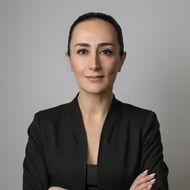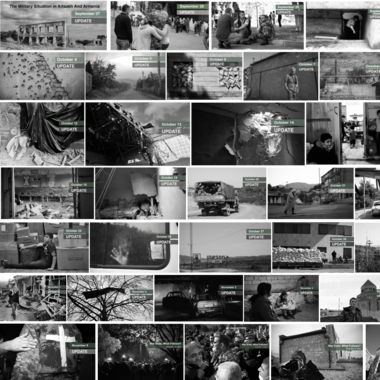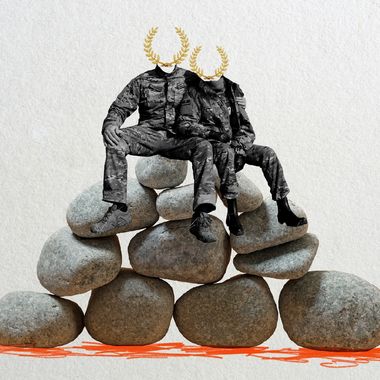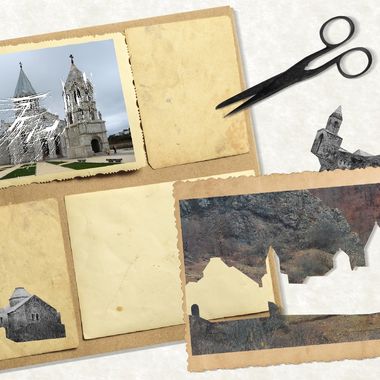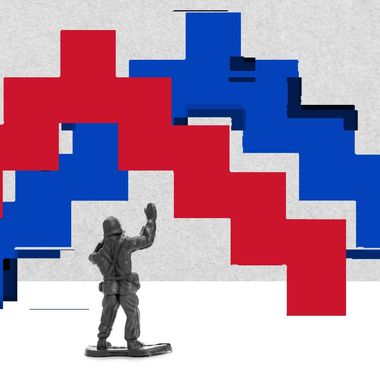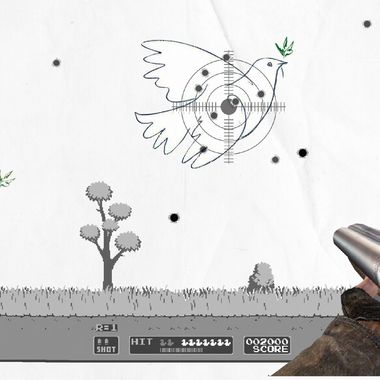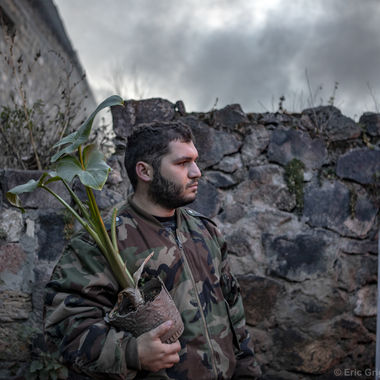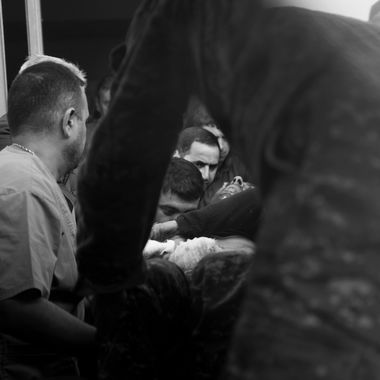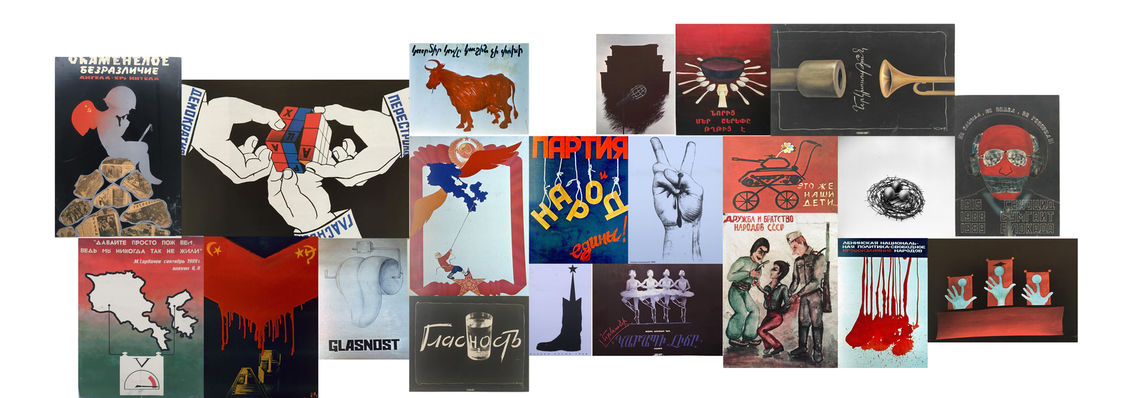
This content is subject to copyright.
Illustration by Armine Shahbazyan.
A year ago today, at around 7:30 am on Sunday morning, I got a call from the ministry.
“Mrs. Ghaplanyan, you need to come to work,” said our head of HR.
“What happened, Mary?”
“War! Azerbaijan started a full scale war.”
My mouth was dry and I had no reply. I quickly got up and rushed to get to the office. The next 44 days were hell; hell for everyone who is Armenian – by birth or by choice.
As I was driving to work, my heart was racing and my mind with it. The images, memories and feeling of war forced themselves upon me violently and with a speed of light that only someone who has lived through war once before could understand. I remembered the funerals of young men in our courtyard, with open caskets, with their wounds and signs of torture on full display. I remembered the sound of heavy artillery and tanks driving down our streets, shaking the foundations of panel buildings and forever imprinting the horror of weaponry and its purpose in a young child’s mind. I remembered the names of fallen men, which we used to hear on the radio, because electricity was shut off and radio was our main source of information from the frontlines. As I was parking the car, I felt my hands and feet go numb, realizing that I am reliving a childhood trauma of war, a trauma of being Armenian.
*
On September 27, 2020, in the middle of a global pandemic, as the world was distracted with fighting a silent enemy killing millions, two dictatorial regimes – Aliyev’s and Erdogan’s – unleashed a full scale war against two democracies – Armenia and Artsakh. By now, Erdogan had already been emboldened by what he had done in Syria and Libya, essentially unchecked for the war crimes and devastation caused; and in his own country, with illegal and politically motivated imprisonment and persecution of thousands of military men, politicians, academics and ethnic minorities. Aliyev’s track record was no less dictator-star-studded. With the worst human rights record in the region, the highest number of political imprisonment, highest number of journalists behind bars, poorest nation in the region despite the enormous hydrocarbon wealth of the country and of the Aliyev-Pashayev families, the Terter case of illegal imprisonment and torture of dozens of Azerbaijani military and civilians, the hunting down and killing or attacking critics of the regime, state institutionalized xenophobia, racism and glorification of crimes against Armenians.
These two regimes, headed by dictators, continued to trade with the West, “build and strengthen” relationships with the EU, and project their agendas across Western capitals. Erdogan exporting political Islam and positioning himself as the new Muslim figurehead, threatening Europeans in their own countries, and Aliyev exporting oil and caviar, silencing European politicians and hiring top-dollar PR companies to portray Azerbaijan as “The Land of Tolerance.” Why wouldn’t these two men feel emboldened to start a war against two small democracies?
With Europe mute, the U.S. frantically engaged in the presidential election, and the world fighting COVID-19, the dictatorial duo masterfully planned and executed a full scale war marked by NATO-style drone and incursion operations, deployment of Syrian mercenaries, use of white phosphorus containing incendiary weapons, incessant shelling of civilians and civilian infrastructure, ISIS style beheadings, torture and murder of civilians, deliberate shelling and destruction of churches and other religious and cultural sites and large scale ethnic cleansing. All the while western and other major media sources were reporting with a language of false equivalency and questioning as to who had the motivation to start the war.
Whether in the 1990s or in 2020, Azerbaijan’s reaction to Artsakh’s calls for self-determination was war and ethnic cleansing. The call for self-determination was born out of the Bolshevik orchestrated injustice of ripping historically Armenian territory with a majority Armenian population (94% in 1923)[1] away from Armenia and incorporating it within the Soviet Azerbaijani administrative borders. Official Stepanakert petitioned Soviet central authorities in 1945, 1965, 1967, 1977 and 1988 requesting reconsideration of a reversal of Stalin’s 1923 unilateral decision, and reincorporating Artsakh back within Soviet Armenia.[2] Each time the Kremlin rejected the official petitions. The petitioning was motivated not only for the purpose of undoing Stalin’s vile act to appease Ataturk under the claim of “proletariat fraternity”, but also because official Baku instituted and perpetrated deliberate cultural and socio-economic cleansing of Armenians in Artsakh (as they did in Nakhichevan).[3]
So when Gorbachev launched glasnost, and with it a seemingly greater openness to redress injustices, the Armenians of Artsakh launched an active campaign aimed at unification. Instead of addressing the plea with caution and employing diplomatic and political tools, Moscow and Baku initiated a full scale military aggression, followed by ethnic cleansing in parts of Artsakh, disguised under the code name “Operation Ring.” Official Baku’s orchestration of gruesome massacres of ethnic Armenians in Sumgait (1988) and Baku (1990) sent a chilling 1915 reminder to all Armenians that if left unarmed, Armenian civilians will be massacred or ethnically cleansed. This is when the small military and paramilitary units in Artsakh began to organize and formed Artsakh’s Defense Army, defending their people and their homes.
The 2020 Artsakh War was similar in the sense that not only was it yet again initiated by Baku, but also that it was marked by a 44-day-long incessant onslaught and deliberate targeting and shelling of civilians and civilian infrastructures.[4] If translated into the definitions and conceptualizations of international law, what official Baku perpetrated over the 44 days amounts to nothing short of crimes against humanity. In addition to this, the full list of war crimes orchestrated by the political and military leadership of Baku, with the support of Ankara, includes willful killing, torture, mutilation and inhuman treatment of civilians and military personnel, proudly recorded and spread on social media; use of banned weapons and war methods; attacks on medical facilities and personnel; destruction of cultural and religious heritage; attacks on press and journalists; sponsoring terrorism and jihadi mercenaries. These crimes are amply documented, often, with the help of the Azerbaijani military personnel themselves, as official Baku had institutionally encouraged and glorified xenophobia, Armenophobia and gruesome murders of Armenians. Nothing short of Saddam or Ghaddafi, Ilham Aliyev’s image, and that of Erdogan, however, remain immune to the wrath of Western institutions and their political establishments in calling them out openly and acting on what they really are – a fossil fuel dictator and a neo-imperial authoritarian.
So why the immunity? The problem is two-fold. On the one hand, Western political and military institutions are experiencing an identity crisis. For example, the European Union’s latest expansion led to further watering down of the EU's position on many issues pertaining to foreign policy and global security. This selective European approach at sanctioning some authoritarians and closing its eyes to others, emanates not from the value system on which the EU was built upon, but from a taciturn calculation as to which motion will get passed in European political institutions.
Considering NATO member Turkey’s unchecked behavior, French President Macron’s statement that “NATO is braindead,” is certainly quite telling, on the one hand, of President Macron’s frank assessment of reality, and on the other of the crisis within the largest military alliance in the world. All the while, Donald Trump’s four year term led the U.S. into deep isolationism, globally causing massive damage and emboldening many dictators, leaving Washington DC with many more terms of new presidencies to undo the harm of the Trump-era.
All these, have left western political establishments more vulnerable to Aliyev’s masterful caviar and oil diplomacy and Mehriban’s ‘generous’ gifts and donations to UN institutions and officials, and hence mute to the regime’s domestic and international crimes.
On the other hand, the Armenian political establishment, with its four consecutive administrations dramatically failed at engaging deeply with western capitals as well as with Moscow, in projecting to the respective political establishments and their respective institutions as to what should Artsakh’s status be, why it has the right for sovereignty, and that adjacent territories are not under occupation but a means of self-defense in light of what had transpired in the 1990s. Point proven in the war of 2020. However, Armenian political administrations sat on the laurels of the victory of the 1990s, and fundamentally failed at employing political, diplomatic or legal instruments in continuing the fight for Artsakh’s remedial sovereignty. Whether it was at Russia’s behest or simply due to lack of political will, lack of capacity and inability to articulate a vision and a strategy and act upon it, is a different question. What, however, remains clear is that every administration, including the current one, is at fault for what transpired, when it comes to Armenia’s and Artsakh’s ability to self-defense, as well as the reactions of the West and the East, and their respective political institutions.
A year after the beginning of this horrific war, and Aliyev continues to parade at UNGA talking about “tolerance”, “peace” and “stability”, all the while continuing to encroach now on Armenia’s sovereign territory, terrorizing and threatening civilian residents of Armenian villages, illegally holding captives and hostages of the 2020 war, torturing them to death, and spewing vile anti-Armenian propaganda and xenophobia, topping it off with a Nazi-style “Military Trophies Park” in Baku.
Peace is elusive and impossible if justice is not served. Aliyev and his political and military regime must be held accountable for the war crimes of 2020 in the court of law and before the international community. The 2020 Artsakh War and the continuous state sanctioned and institutionalized racial discrimination and acts of violence against Armenians, provide ample ground as to why Artsakh should not and cannot be subjugated to the rule of Baku. Peace cannot be served by strong-arming an agreement, like the one signed by Nikol Pashinyan, Ilham Aliyev and Vladimir Putin on November 9, 2020, nor can it be executed if the most fundamental issues of that agreement are deliberately ignored (e.g. the return of the POWs) not only by the perpetrator but by the mediator.
Erdogan and his regime must be held accountable for financing and transporting terrorists to Artsakh and abetting Baku’s regime in continuing the war and perpetrating other war crimes. Erdogan must also be held accountable for continuing to uphold Armenian Genocide denial and glorifying its perpetrators. Especially, in light of Erdogan’s continuous pressure on Armenia for the creation of the so-called “Zangezur corridor”, which is nothing short of encroaching on Armenia’s territorial integrity and sovereignty, all the while accommodating his neo-imperial agenda of having a consecutive land connection between all Turkic nations – the bizarre ideological agenda of Enver Pasha, for which, among other things Kemal Ataturk considered him dangerous and did not allow him to return to Turkey.
Conclusion
Dr. Harutyun Marutyan in his book, “Iconography of Armenian Identity,” documented posters of the Karabakh Movement between 1988 and 1991 and concluded, that an overwhelming majority of those posters recollected the Armenian Genocide. It is not surprising, hence, that on December 10, 2020, when Erdogan delivered a speech in Baku during the Azerbaijani regime’s “Victory Parade” he invoked Enver Pasha’s name and legacy. The massacres of Armenians during the Sumgait and Baku pogroms, during the war in 1990s (e.g. Maragha massacre), the 2016 April War, and the most recent gruesome beheadings and mutilation of Armenian civilians by Azerbaijani military in the war of 2020, in the conscious and subconscious experiences of all Armenians are reminiscent of the 1915 Armenian Genocide. Not only because then it was Turkey and now its client state that persecutes and murders Armenians for no other reason but for being Armenian. But also or more so because the world powers were and are too slow to react and stand up to the dictators’ criminal agendas, if their interests are not directly (yet) threatened. Turkey engaged and continues to engage in denialism, which has become a part of not only Turkish political and state institutions, but also of Turkish identity; while the Azerbaijani regime operates on historical revisionism and mirror propaganda, utilizing modern day media instruments to lie and deceive the world and its own citizens.
In four years, the Russian forces deployed in Artsakh with a peace-keeping mandate – in reality a mandate protecting the Armenian population from ethnic cleansing – will most likely leave, at the request of Baku. This would mean that the remaining population will be in imminent threat of ethnic cleansing, and eventual loss of Artsakh. There are many variables that could alter that scenario, ranging from Armenia growing stronger and resisting this development, to Russia not agreeing to withdraw, to Baku restarting military aggression. However, there is one constant, in which Armenia and countries that prioritize human rights and justice, can and should engage, and that is holding Erdogan and Aliyev’s regimes accountable for the war crimes and crimes against humanity, whether these are through proceedings at the European Court of Human Rights, the International Court of Justice, or through the UN Security Council resolutions and bilateral legal diplomacy leading to sanctioning of both regimes. The pressure must be real and palpable, as dictators’ know one language, and that is force – legal, diplomatic, political or military.
------------------------
[1] Christopher Walker, “Armenia and Karabakh: The Struggle for Unity,” (London: Minority Rights Group Publishers, 1991): 108
[2] Irina Ghaplanyan, “Post Soviet Armenia: New National Elite and New National Narrative,” (London: Routledge, 2017): 154
[3] There were no institutes of higher education in Artsakh (despite multiple requests and petitions) and Armenians had to go to Baku, as the option of pursuing higher education in Yerevan was very difficult due to institutional regulations (and once in Yerevan, the return to NKAO was also complicated). Armenian language broadcasts were not allowed to be relayed to Artsakh, and local stations as of the 1960s were forced to broadcast only in Russian or Azerbaijani. The administrative centers, which the populace had to deal with, all lay in Azerbaijan proper. Armenian historical monuments decayed, either through neglect or deliberate vandalism. Even water resources were being tapped for the benefit of Azerbaijan and not the villages of Artsakh. In addition to that, Artsakh was entirely dependent on Baku for the allocation of funds for economic development. Baku was “extremely reluctant to allocate funds and resources necessary for economic development in the region”. Finally, in addition to all of the above, the Soviet-era propiska system was employed in Karabakh as well — meaning the obligatory residence permits which precluded the possibility of freely moving around the republics.
[4] Baku’s authorities ethnically cleansed the Shahumyan region of Artsakh in 1991, and since then it has been under their occupation.
Also see
A Chronology of the 44 Days of War
Today, September 27, marks the one year anniversary of the start of the 2020 Artsakh War. Here is a chronology of the 44 days of war and beyond that we published last year.
The Aliyev Regime’s Frustration and Hubris
By Nerses Kopalyan
The Aliyev regime is profoundly frustrated, writes Nerses Kopalyan, however, this frustration is an inherent byproduct of Baku’s illusions of grandeur and the awkward hubris that has consumed Ilham Aliyev.
How Ilham Aliyev “Personalizes” the Results of the 2020 Artsakh War
By Tatevik Hayrapetyan
After launching an attack against Artsakh in 2020, Azerbaijani President Ilham Aliyev has taken every opportunity to take personal credit for Azerbaijan’s military successes, along with his family.
Artsakh’s Cultural Heritage Under Threat
By Hovhannes Nazaretyan
Armenian cultural, religious and historical monuments and sites currently under Azerbaijani control in the aftermath of the 2020 Artsakh War are under immediate threat of vandalism and destruction.
Russian Peacekeepers in Artsakh
By Lusine Sargsyan
A day after the trilateral agreement ending the 2020 Artsakh War was signed, the first contingents of Russian peacekeepers were deployed. Six months in, clarifications regarding the size, mandate and mission of the peacekeepers are still not clear.
International Human Rights Organizations and Victim-Blaming
By Karena Avedissian
International human rights defending organizations have been speaking in a language of “neutrality” which, in the context of the war crimes committed by Azerbaijan during and after the 2020 Artsakh War, is anything but objective, writes Karena Avedissian.
Understanding the Aliyev Regime’s Armenophobia
By Nerses Kopalyan
The contours of Armenophobia presuppose the dehumanization of an entire people, where hatred and aversion towards an Armenian is embedded in Azerbaijan’s political culture, writes Nerses Kopalyan.
People of War: Living With the Aftershocks
By Gohar Abrahamyan
Faced with loss and uncertainty, the Armenians of Artsakh are trying to come to grips with the defeat following the war and finding a way to pick up the pieces of their shattered lives.
Lives Undone
By Eric Grigorian
In Artsakh, there is a somber air of loss, uncertainty and grief. During 45 days of war, everyone and everything from soldiers to villagers, trees to structures were afflicted and irreversibly altered. A collection of images from November 12-14, a few days after the "peace" agreement.
Baku’s Military Trophy Park and the Defeat of Humanity
By Maria Titizian
A Military Trophy Park-Museum dedicated to Azerbaijan’s military victory over Artsakh was inaugurated in Baku. It is a gruesome display that includes hundreds of helmets of Armenian soldiers killed in battle and grossly exaggerated life-size figures of dead and dying captives.

